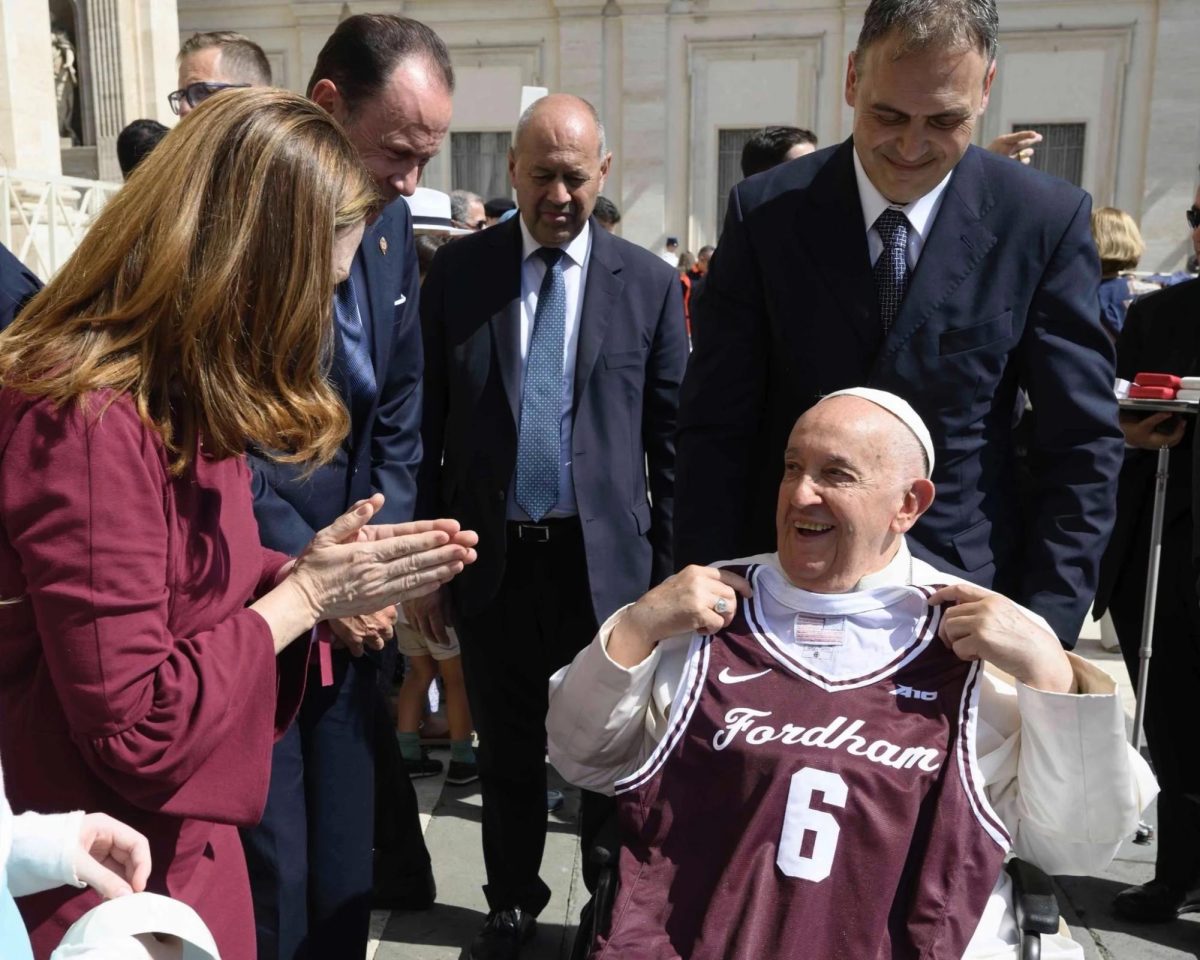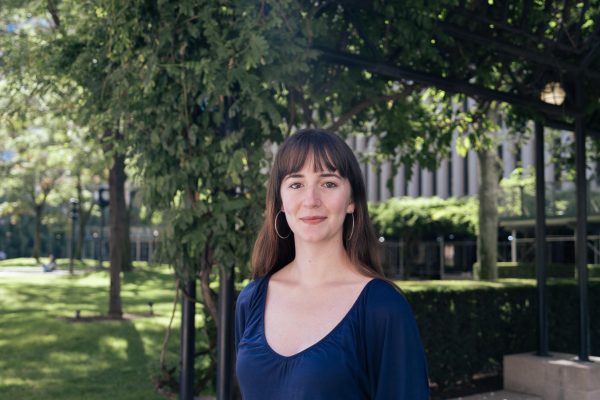Pope Francis, whose papacy shifted the Vatican’s role in a changing world, died in the early hours of April 21. He was 88.
Francis was the first Latin American pope, the first Jesuit pope and the first pope to take the name of Saint Francis of Assisi.
According to Michael Lee, professor of theology at Fordham, Francis lived up to his namesake.
“The three great priorities of Saint Francis of Assisi were: poverty, peace, and creation. Certainly, Pope Francis has pursued all of those three priorities in powerful ways,” Lee said.
Francis was born Jorge Mario Bergoglio in 1936 in Buenos Aires, Argentina to Italian immigrant parents. He joined the Jesuit order of priests in 1969, serving as the archbishop of Buenos Aires in the 1990s before being elevated to the position of cardinal in 2001 by Pope John Paul II.
Fr. Bryan Massingale praised Francis’ compassion for all of humanity.
“You sensed that when he acted, it was out of genuine humanity; a compassion that stemmed from his deep faith in God,” Massingale said.
Francis was an outspoken advocate for action to slow climate change. His 2015 encyclical “Laudato Si’” presented environmental protection as a religious imperative for Catholics.
“He wanted the church to be a place where everyone, without exception, were welcomed and treated with dignity.” Bryan Massingale, priest and professor
Pope Francis met with Indigenous leaders in Canada to apologize for the Catholic Church’s role in building and maintaining residential schools. Under his leadership, the Vatican also rejected the “Doctrine of Discovery,” which claimed that all lands not inhabited by Catholics were open to “discovery” and seizure. This doctrine was used to justify colonialism and the religious persecution of Indigenous people.
Pope Francis was more accepting of the LGBTQ+ community than any of his predecessors. His track record on the issue of homosexuality was nuanced. Notably, when asked about a priest who was rumored to be gay, he did not pass judgment on the priest’s possible sexuality. However, homosexuality is still seen as a sin in Catholic doctrine.
According to Lee, Francis’ statement signaled “an openness to LGTBQl+ people never uttered from a pope before.”
Francis formally approved the practice of priests blessing same-sex couples. Additionally, during his papacy, the Church clarified that transgender people could be baptized and serve as baptismal godparents or witnesses to marriages.
“He wanted the church to be a place where everyone, without exception, were welcomed and treated with dignity,” Massingale said.
Francis was particularly outspoken about the wars in Gaza and Ukraine, praying for peace in those regions during public appearances. He called a Catholic parish in Gaza regularly after bombings began in the region, according to CNN. During one of his last public appearances, he called for a ceasefire in Gaza and condemned the war.
Recently, the Pope made headlines for denouncing the U.S. government’s immigration policy in a letter to U.S. bishops. Francis emphasized that Catholicism could not be weaponized to justify mass deportations of immigrants, as this was in violation of the human dignity of migrants.
In a university-wide email, University President Tania Tetlow echoed Pope Francis’ calls to reform the Church toward greater inclusivity and extended that mission to the Fordham community.
“His emphasis on social justice, inclusion, and environmental stewardship leaves a lasting legacy—one that calls each of us to continue his work,” Tetlow wrote.
Fordham has responded to Pope Francis’ papacy in many ways, including hosting the Outreach Conference, which centers around LGBTQ+ Catholic Ministry, in 2022 and 2023. The International Political Economy and Development graduate program published the Pope Francis Global Poverty Report in 2024. In addition, Fordham sent a delegation of students and professors to the Synod on Synodality in 2023 and 2024.
A synod is a meeting between community members that discusses Catholic doctrine. The 2023 synod was the first to include laypeople, that is, those who are not ordained leaders of the church.
“Pope Francis, until his final moments, encouraged us to seek out grace in everyone, even those with whom we might not agree or align with, a powerful message for a society that often feels splintered and divided.” William Gualtiere, FCLC ’25
William Gualtiere, Fordham College at Lincoln Center (FCLC) ’25, attended the synod with the Fordham delegation in 2023. He remembers Pope Francis as a leader rooted in love and joy.
“Pope Francis, until his final moments, encouraged us to seek out grace in everyone, even those with whom we might not agree or align with, a powerful message for a society that often feels splintered and divided,” Gualtiere said.
Lee traveled to Vatican City in 2023 and 2024 alongside students and other faculty members. He said that the synods were indicative of Francis’ preoccupation with the voices of all church members.
“I can’t forget the image of the round tables of the synod hall replacing the huge auditorium that was only focused on one speaker. This is the church that Francis was inviting us to envision,” Lee said.
Tetlow met Pope Francis during a trip to Rome in June 2024. According to Tetlow’s email, upon being presented with a Fordham sports jersey, the pontiff “smiled and blessed our great University.”
“Now is a moment for the Church to choose a leader who will represent the next century of Catholicism.” Jay Doherty, FCRH ’26
The funeral took place on Saturday, April 26 in St. Peter’s Square in Vatican City. Following Francis’ tendency to break from Vatican norms, his funeral followed an updated papal funeral rite that he approved in 2024. The updated rites allow for him to be buried outside of the Vatican in the Papal Basilica of St. Mary Major in Rome.
After the mourning period ends, a new pope is elected by the College of Cardinals. All cardinals under the age of 80 will be eligible to appear at the papal conclave, during which the cardinals will be locked in the Sistine Chapel and denied contact with the outside world as they vote until they come to a two-thirds majority conclusion about who the next pope should be. The next conclave will begin on May 7.
After Francis’ death, the expectations for what a pope can and should be like have changed. Jay Doherty, Fordham College at Rose Hill (FCRH) ’26, and a student who also attended the 2023 synod, expressed his hopes for a pope who would keep up with the changing Church.
“I think it’s crucial that whatever happens, they take into account that the Church of ten years ago is not the same Church as today, the Church of a hundred years ago is not the same as today,” Doherty said. “Now is a moment for the Church to choose a leader who will represent the next century of Catholicism.”
As the Church looks to the future, Francis’ example serves as guidance for those who hope for a more inclusive Church.
“I hope, like Francis, the new pope will continue to preach and be an inspiration for outsiders and those on the margins and, ultimately, inspire a continued welcoming Church that loves and delivers its people in a just and courageous direction,” Gualtiere said.
Pope Francis connected with many Catholics in an inimitable way. Through his unwavering commitment to the vulnerable and marginalized in society, Pope Francis will be remembered as a pontiff who exhibited exceptional care and compassion.


